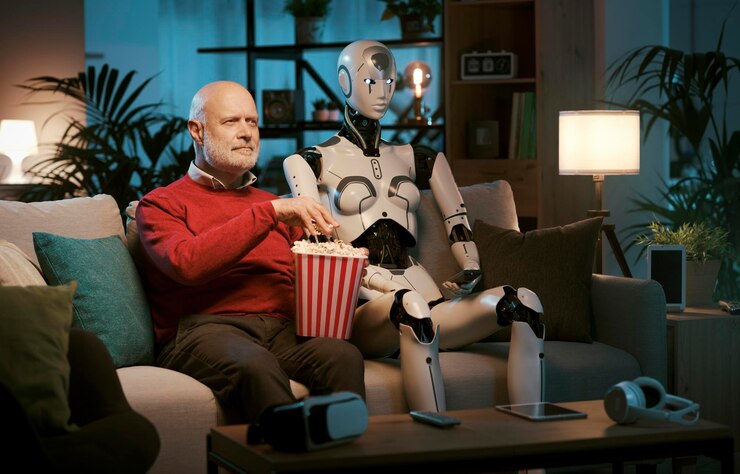In the fast-moving world of technology, Artificial Intelligence (AI) has emerged as a game-changer across industries, particularly in software development. For programmers, AI isn’t replacing jobs; instead, it is transforming workflows and enabling smarter, faster, and more efficient software creation.
This new era is about collaboration: human creativity paired with AI’s analytical power. Developers can leverage AI tools to tackle repetitive tasks, enhance code quality, and explore new possibilities in software engineering. This article explores the ways AI is reshaping programming, the benefits for developers, and why the role of the programmer has never been more valuable.
How is AI Transforming Software Development?
Artificial Intelligence offers solutions that streamline tasks, optimize development processes, and improve software performance. Here are the key areas where AI is making its mark:
1. AI-Powered Code Assistance
AI-driven tools like GitHub Copilot and Tabnine help programmers write cleaner, faster code. By analyzing massive codebases, these tools predict and suggest code snippets, auto-complete functions, and offer syntax corrections.
- Faster Development: Programmers spend less time typing repetitive lines of code.
- Reduced Errors: AI tools spot mistakes in real-time and ensure clean, functional code.
For example, imagine working on a complex function where AI suggests the correct loop or algorithm structure based on your project’s requirements. It saves time and boosts accuracy.
2. Bug Detection and Prevention
Bugs are an inevitable part of software development, but fixing them is time-consuming. AI tools like Snyk and DeepCode automatically analyze code to detect errors, vulnerabilities, or areas needing improvement.
- Improved Accuracy: AI’s ability to analyze millions of lines of code minimizes the risk of missed issues.
- Faster Debugging: Developers spend less time hunting bugs and more time building features.
This proactive approach to bug detection ensures that software is reliable and secure before reaching users.
3. Automated Testing and Debugging
Automating tests is another way AI simplifies software development. AI-powered testing tools like Testim.io generate test cases, identify errors, and suggest fixes.
- Efficient Testing: Automated tests run faster and cover more edge cases.
- Quality Software: By catching issues early, AI ensures seamless software performance.
For instance, regression testing—a repetitive task for developers—can now be fully automated, freeing up time for innovation.
4. Smarter Code Refactoring
Code refactoring is crucial for maintaining clean, efficient codebases, but it often gets overlooked. AI can analyze code structures, detect redundancies, and recommend optimizations.
- Enhanced Maintainability: Cleaner code is easier to manage and update.
- Performance Boost: Optimized code results in faster, more efficient applications.
Tools like Refact.ai identify unnecessary complexities and provide actionable suggestions for improvements.
Benefits of AI for Programmers

The integration of AI into software development workflows brings significant advantages:
- Time Savings: By automating repetitive tasks like testing, bug detection, and documentation, programmers can focus on solving complex, creative problems.
- Improved Code Quality: AI tools ensure cleaner, error-free code, resulting in more stable applications.
- Enhanced Collaboration: AI bridges the gap between junior and senior developers, offering guidance and improving productivity across teams.
- Continuous Learning: AI-powered tools provide insights and suggestions, helping developers learn new techniques and best practices.
By acting as an intelligent assistant, AI empowers programmers to become more effective and innovative.
AI and Human Programmers: A Perfect Collaboration
The idea that AI will replace programmers is a misconception. Instead, AI complements human expertise, enabling programmers to do more.
Why Human Creativity Still Matters
AI is powerful, but it lacks human intuition, creativity, and the ability to innovate. Programmers bring:
- Problem-Solving Skills: AI handles routine tasks, while developers focus on creating unique solutions.
- Adaptability: Humans can adapt to new challenges and think outside the box, something AI struggles to replicate.
- Decision-Making: AI offers insights, but humans decide what solutions are best for specific contexts.
For example, while AI can suggest an algorithm for a particular problem, it takes a programmer’s critical thinking to determine its real-world applicability.
Practical Examples of AI in Software Development
AI’s real-world impact in programming is already evident. Here are some examples:
- Web Development: Tools like Wix ADI generate website designs and frameworks based on user inputs.
- Game Development: AI helps create smarter NPCs (non-playable characters) and dynamic environments.
- Data-Driven Applications: AI algorithms help businesses build predictive models for customer behavior or financial forecasting.
These examples demonstrate how AI-driven tools are enabling developers to deliver smarter, faster, and more innovative software solutions.
The Future of AI in Programming
The role of AI in software development will continue to expand. Here’s what we can expect:
- AI-Enhanced IDEs: Future development environments will provide real-time insights, automatic bug fixes, and predictive analytics.
- Tailored AI Solutions: AI tools will adapt to individual programmer workflows, offering personalized suggestions.
- Ethical AI Use: As AI becomes integral to programming, ensuring ethical use and transparency will be a priority.
Conclusion
The rise of Artificial Intelligence in programming signals an exciting shift for developers. AI tools are transforming coding, testing, debugging, and collaboration, making the software development process faster, more efficient, and error-free.
However, the heart of programming remains with human creativity. Programmers are irreplaceable because they bring the innovation, decision-making, and problem-solving skills that machines lack.
By embracing AI as a partner, programmers can unlock new levels of efficiency and creativity. This collaboration between humans and machines is what will define the future of software development—a future where technology empowers people, and possibilities are limitless.
FAQs
- How is AI helping programmers in software development?
AI automates repetitive tasks like code generation, bug detection, and testing, allowing programmers to focus on creative and complex problem-solving. - Will AI replace human programmers?
No, AI complements human creativity and expertise. It enhances productivity but still relies on developers for innovation and decision-making. - What are the main benefits of AI tools for developers?
AI tools improve code quality, save time, reduce errors, and provide intelligent suggestions, enabling faster and more efficient development.











